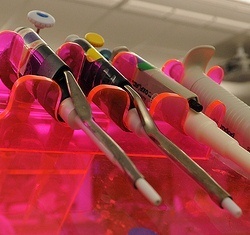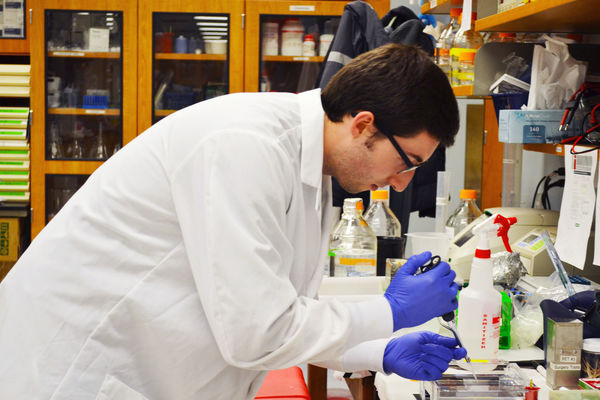

Matt Messana
Understanding the mechanisms of cancer progression is incredibly important in discovering a cure. Matthew Messana, a senior biochemistry major at the University of Notre Dame, is dedicated to investigating the mechanisms that are relevant to breast cancer. Messana works in the lab of Laurie Littlepage, Campbell Assistant Professor of Cancer Research at the Harper Cancer Research Institute. Littlepage’s research focuses specifically on the contributions of the surrounding microenvironment to both cancer progression and normal tissue development in the mammary gland and prostate.
Messana has focused on a variety of projects during his years at the lab. First, he helped a graduate student with her project, and by the summer of 2013 he had begun working on his own sub-project. Messana’s research primarily investigates a protein called ZNF217. He hypothesizes that cellular localization of this protein is contributing to the poor prognosis in patients. He has also identified a truncated form of the protein is missing in cancer patients. Ultimately, Messana hopes that determining the value of ZNF217 will help develop an assay to detect poor prognosis in breast cancer patients.
Not only has Messana made important scientific contributions, he has become an important leader in his lab. Having joined the Littlepage laboratory in the beginning, Messana has had ample experience not only researching cancer, but teaching others about their research. Currently, he is the second most senior member of the laboratory. His duties include assisting and mentoring the lab’s newest members. In addition to helping new undergraduate researchers, Messana also interacts with high school students and graduate students.
Additionally, over the past two summers Matthew has taught high school students who have joined the lab through Project SEED. This program offers students from economically disadvantaged backgrounds the opportunity to explore scientific careers. Reflecting on his experiences, Matthew says, “teaching has been an extremely rewarding experience, and I hope to continue teaching in some capacity beyond my undergraduate studies.”
The enriching experience will also beneficial for Messana’s future. Research has allowed him to develop critical thinking and problem-solving skills, which he will need when he becomes a physician. It has been exciting for him to not only present his findings at conferences, but see how his efforts may one day translate to medical advances. Summarizing his ambitions, Messana concludes what is ultimately important is “using my talents and effort to contribute in any way I can to advancing the knowledge we currently have about cancer and how to stop this terrible disease.”
Originally published by Samaria O’Brien at harpercancer.nd.edu on March 18, 2015.